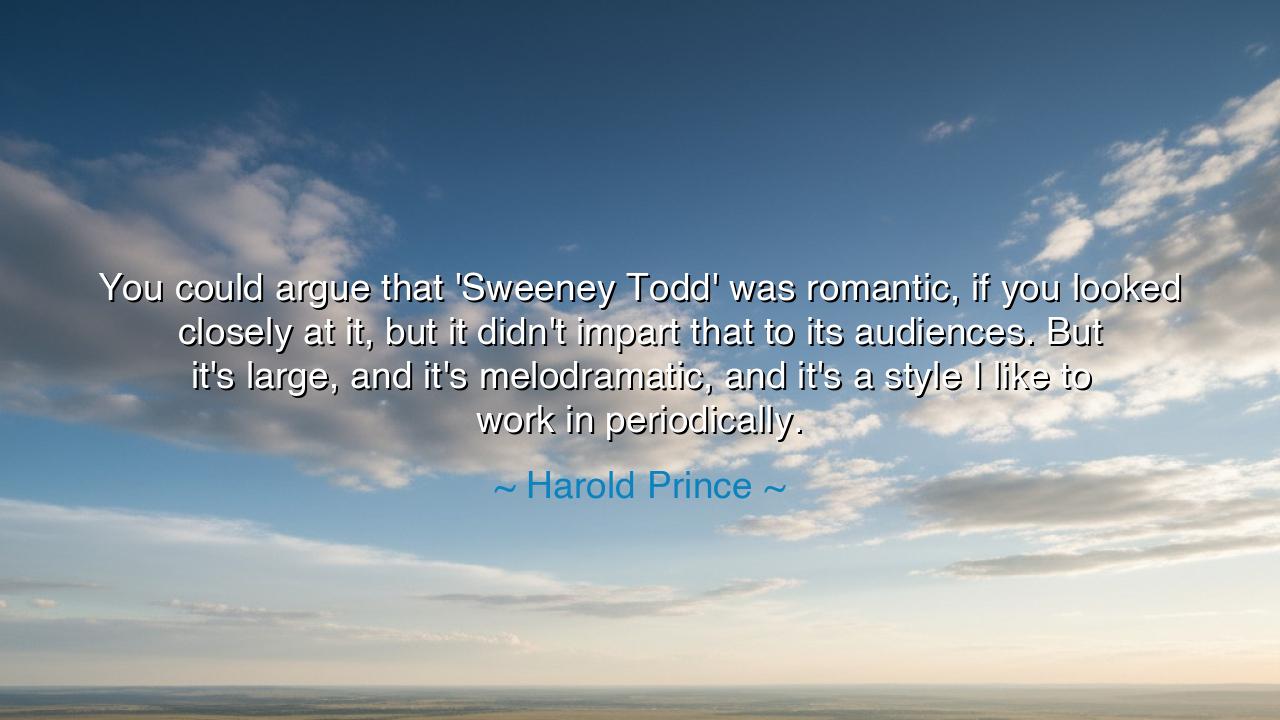
You could argue that 'Sweeney Todd' was romantic, if you looked
You could argue that 'Sweeney Todd' was romantic, if you looked closely at it, but it didn't impart that to its audiences. But it's large, and it's melodramatic, and it's a style I like to work in periodically.






In the wisdom of Harold Prince, who reflects on the nature of "Sweeney Todd" with the words, "You could argue that 'Sweeney Todd' was romantic, if you looked closely at it, but it didn't impart that to its audiences. But it's large, and it's melodramatic, and it's a style I like to work in periodically," we are invited to examine the tension between surface and depth in art. Prince’s statement suggests that beneath the melodrama of the story, there is a subtle undercurrent of romance—not in the conventional sense of love and happiness, but in the tragic and darkly idealized nature of the characters' pursuits. He reveals that the style of storytelling, with its sweeping emotionality and grand gestures, is not merely an aesthetic choice, but a deliberate engagement with the intensity of human experience, one that can speak to our deeper, more complex emotions.
The very essence of the romantic spirit is not just found in tales of idyllic love, but in the yearning for something greater, something unattainable. In Sweeney Todd, the protagonist’s desire for revenge is a passionate pursuit, driven by a deep love for his lost family and a desire to right a wrong that cannot be undone. In this way, the play is imbued with a romantic sensibility, not in its conventional sense, but in the sense that the characters are driven by an overwhelming emotion that distorts their actions and the world around them. Just as the ancient tragedies often explored the destructive force of hubris, fate, and the irrational nature of human desire, so too does "Sweeney Todd" reflect these eternal themes of human struggle.
This tension between romanticism and melodrama is not a new concept in the history of storytelling. In ancient Greek drama, we see characters whose intense desires—whether love, revenge, or honor—lead them to their ultimate downfall. Consider the story of Orestes, whose love for his father and his need for revenge led him to murder his own mother, driven by a sense of justice that ultimately consumed him. The Greeks understood that the romantic ideal, when taken to extremes, often leads to destruction rather than redemption. This is the heart of Sweeney Todd: a character whose idealism becomes a destructive force, wrapped in the tragedy of his own making.
What Harold Prince seems to recognize in his work is the timeless appeal of melodrama, a style that amplifies human emotions to their highest pitch, making them impossible to ignore. This largeness of emotion is a powerful tool that allows us to experience the depths of human feeling. In a world where we are often encouraged to temper our emotions and act with reason, melodrama provides a rare space where emotion can run wild, uncontrolled by the rational mind. It calls upon the ancient archetypes—the hero, the villain, the tragic lover—and places them at the center of our experience. Through these exaggerated expressions of desire and loss, we are reminded of the forces that shape our own lives, forces that often lie beneath the surface of our everyday existence.
The style that Prince speaks of, one that blends the grandiose with the tragic, is a reflection of the way in which humans have always used art to reflect their deepest truths. In Shakespeare’s tragedies, we see the same elements: the intensity of emotion, the largeness of human ambition, and the eventual downfall of characters who reach too far, driven by forces beyond their control. This style—so visceral and in-your-face—is not meant to comfort but to confront, to make us feel the power of human emotions in all their rawness. Like the ancient epics, melodrama forces us to face the extremes of the human condition, whether in love, loss, or revenge.
The lesson to be learned from Prince’s words is this: the romantic is not always about the gentle or the idealized; it is about the depths of human emotion and the pursuit of something so deeply felt that it transcends reason. We are reminded that passion, when unchecked by wisdom, can lead to destruction, but it can also lead to a deeper understanding of ourselves and the world around us. Just as Orestes’s revenge and Sweeney Todd’s thirst for vengeance lead to their ultimate demise, so too can our own passions—be they for love, success, or justice—take us to places we do not fully understand until we are there. Yet in this journey, we often discover the truth of our deepest desires, and it is this very discovery that shapes us.
As you walk through life, allow yourself to embrace the largeness of your emotions, but do so with awareness. Feel deeply, but be mindful of how those emotions shape your actions and the world around you. Like the melodrama of "Sweeney Todd," life is not just about the quiet moments of peace but about the grand, sweeping arcs of love, pain, and ambition. Let these passions fuel your journey, but temper them with the understanding that, like the tragic heroes of old, they can either create or destroy. In the balance of this romanticism, you will find the deepest truths of your own heart.






AAdministratorAdministrator
Welcome, honored guests. Please leave a comment, we will respond soon